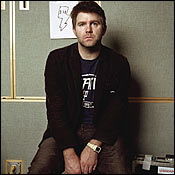
For most of his professional life, New Jersey–born rocker James Murphy was just getting by, playing guitar in indie bands that never quite broke out. But then in the late nineties, Murphy dropped ecstasy, turned on to the sounds of dance-music maestros like Larry Levan, and started throwing parties in Williamsburg and downtown Manhattan. He also started a new band, LCD Soundsystem, which helped refine the style that came to be dubbed “dance rock.” Murphy founded a label (DFA, an acronym for Death From Above) with British expat Tim Goldsworthy in 1999. This month, DFA, under a new distribution deal with EMI, is issuing a sprawling three-CD compilation, covering acts like Black Dice and Juan MacLean. Ethan Brown spoke to Murphy about the DFA stable and sound.
Why three CDs for the new compilation?
We weren’t satisfied with our first compilation CD. It wasn’t completist, nor was it a great listen. And we all agreed that it came out too late; most people already had the records. So we were determined to make the second compilation better.
It seems like New York’s club scene—which inspired you and Tim to start DFA—has been going through a prolonged slump.
It’s been dead for a while, but it’s starting to get dead-exciting, which I like.
What does “dead-exciting” mean?
It’s when things are horrible, and people want something good, which is different than when things are horrible but they don’t want something good. They just want to go home.
Is DFA returning to the club business?
I’ve been thinking about it a lot, which I’m sure will bum everybody out because it’s time for my album to come out .But I promise that the parties will be a little bit not-normal.
Why has the LCD Soundsystem record taken so long?
Because I didn’t want to put any of the singles on the record. I felt like that was … cheating. You have the singles and you can’t wait for the album, and the album comes out and it has all of the singles you already have. That feels disrespectful. But if you’ve never heard the band before, it would be silly to lose that chunk of history. So I made two CDs: the album and a singles compilation of six songs. There’s also a last song, which is specifically designed as a last song.
What constitutes a last song?
They erase the record. You know “Good Feeling” by the Violent Femmes? That’s a crushing last song. After that, you have to hear the whole record again.